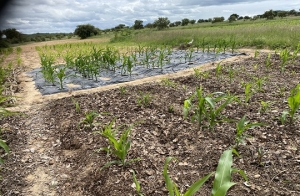The ACP-MEAs 3 project brings hope to the farmers in Zimbabwe, who are facing the challenges of climate change head-on and are determined to adapt to these challenges using nature-based solutions.
In a region where about 70 per cent of the population depends on agriculture, the frequency of El Niño occurrences in Southern Africa surpasses the norm, resulting in erratic weather patterns that significantly impact food security.
With the return of the El Niño oceanographic phenomenon, following three years of La Niña, the Food and Agriculture Organization of the United Nations (FAO) in Zimbabwe has undertaken several actions to improve the resilience of rural communities.
In Gokwe, Makoni, and Mt Darwin rural districts, FAO works with farmer groups at nine Farmer Field Schools (FFS) to promote practices for better adaptation to climate change effects using nature-based solutions.
“The farmers are being given technical assistance by FAO in partnership with the Ministry of Lands, Agriculture, Fisheries and Rural Development (MoLAFWRD) under the European Union’s (EU) funded ACP-MEAs 3 project, a project that seeks to strengthen environmental governance and implementation of the Multilateral Environmental Agreements (MEAs) in the country.
These efforts are aimed at equipping farmers with the necessary knowledge and tools to adapt to the unpredictable weather patterns like the current El Niño,” said Kudzai Kusena, the International Biodiversity Expert and ACP-MEAs 3 project coordinator in Zimbabwe.
Through the FFSs, farmers have been learning and developing ecosystem-based solutions by integrating new technologies and traditional knowledge to address their challenges at community level.
“The concept of farmer field schools has shifted farmers’ mindsets as they realize the benefits of ecosystem-based agricultural practices. Many farmers are now capacitated to take anticipatory actions against adverse climate events like El Niño,” asserted Obert Maminimini, the ACP MEAs 3 National Project Coordinator at FAO.
In the 2023/24 season, the FAO-led FFSs have responded to the El Niño induced drought threats by refocusing their experimental studies on climate-proofing agriculture, ecosystem-based agricultural practices, and crop diversification. The farmers have managed to plant early and are applying in-field water harvesting and moisture conservation techniques.
“The current rainfall season is very bad for crop production. However, I and other farmers in the community are employing techniques like tied ridges and mulching, which we learnt at the farmer field school. This has helped us establish a good crop that is at the late vegetative to early reproductive stage,” said Lazarus Kamutaru, a member of Tsakari FFS in Mt. Darwin
Rainwater harvesting and moisture conservation sustainable solutions to El Niño induced drought.
The farmers are using rainwater harvesting to maximize the utility of the rainfall received, conserve soil and water resources, and improve crop yields. Some in-field water harvesting techniques studied at the FFSs include potholing, tied ridges, and infiltration pits.
The farmers are also studying various mulching options to conserve soil moisture. They are experimenting with dead mulch, using maize stover, dry grass, leaf litter, and black plastic. In cases where maize stover, a key mulching material, is scarce, farmers are experimenting with live mulch, which involves intercropping maize with cowpeas or sugar beans. Live mulching has been observed to attract beneficial insects, which can help to control pests and improve pollination.
“These sustainable practices are part of a broader movement towards conservation agriculture, emphasizing the importance of maintaining permanent ground cover to protect soil health and improve crop resilience. By adopting these techniques, farmers can mitigate the impact of El Nino and build more resilient farming systems for the future,” added Obert Maminimini.
Managing El Niño related crop distress
To manage El Niño -related crop distress and ensure food security, farmers at the FFSs have invested in drought-tolerant seeds, crop diversification and selection of seed and crop varieties suitable for their respective communities.
In one such study, experiments were conducted to evaluate the adaptability of seven varieties of groundnuts, two varieties of finger millet, four varieties of round nuts, five varieties of cowpeas, two varieties of pearl millet, and maize to the agroecological zone and short, low rainfall season. The experiments also considered the agronomic characteristics and processing or cooking qualities, among others, to ensure that the selected crops will be well-suited to the local area.
Organic fertilizers winning strategy for FFFs in El Niño season.
As the spectre of El Niño looms large over the agricultural sector, farmers are looking for innovative ways to combat its impact on crops. In this context, the FFS groups are testing the effects of various locally available organic fertilizers on crops, including goat, chicken, cow manure, and thermal compost. They are also comparing the results with those from the use of synthetic fertilizers.
“Using these locally available organic materials allows us to work with beneficial microorganisms. These microorganisms work with the crops to increase bioavailable nutrients and protect our crops from pests and diseases,” stated the Chairperson of Chiedza FFS, Garnett, in Makoni.
The farmers are also experimenting with different combinations of lime with organic and synthetic fertilizers to enhance crop performance. Liquid poultry manure, made by mixing droppings with water and leaving it to react for about seven days, is also being tested as a top-dressing fertilizer. This is compared with solid poultry droppings, which were effective in last season’s experiments.
Other experimental studies at the FFSs
In addition to soil and water conservation studies, farmers at the farmer field schools experimented with various ecosystem-based solutions to agricultural production challenges. Farmers are experimenting with using pigeon droppings (pouring droppings mixed with water on sorghum heads) and covering sorghum heads with plastics to protect the sorghum grains from birds. Different organic fertilizers (compost, ash, chicken manure, cow manure) are being tested for nematode control on Irish potatoes.
“While the outcomes of these studies are still in progress, the FFS’s commitment to finding sustainable solutions to climate change is a positive step towards a transformative and more resilient future for our agricultural industry,” said Kudzai Kusena.
Article from FAO

